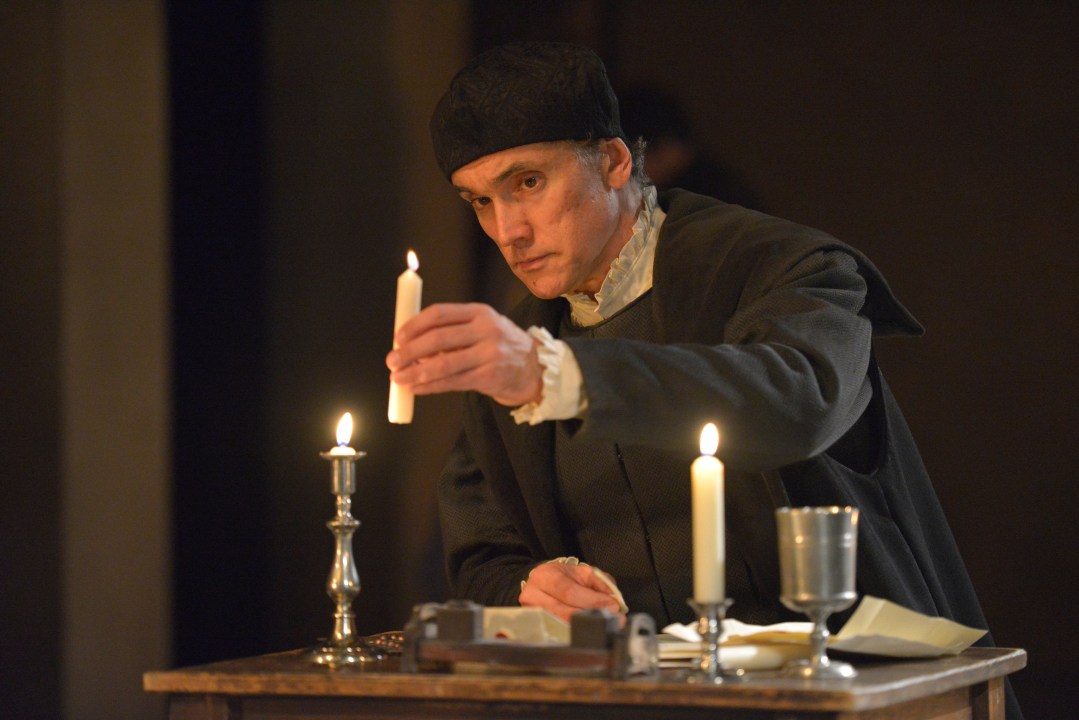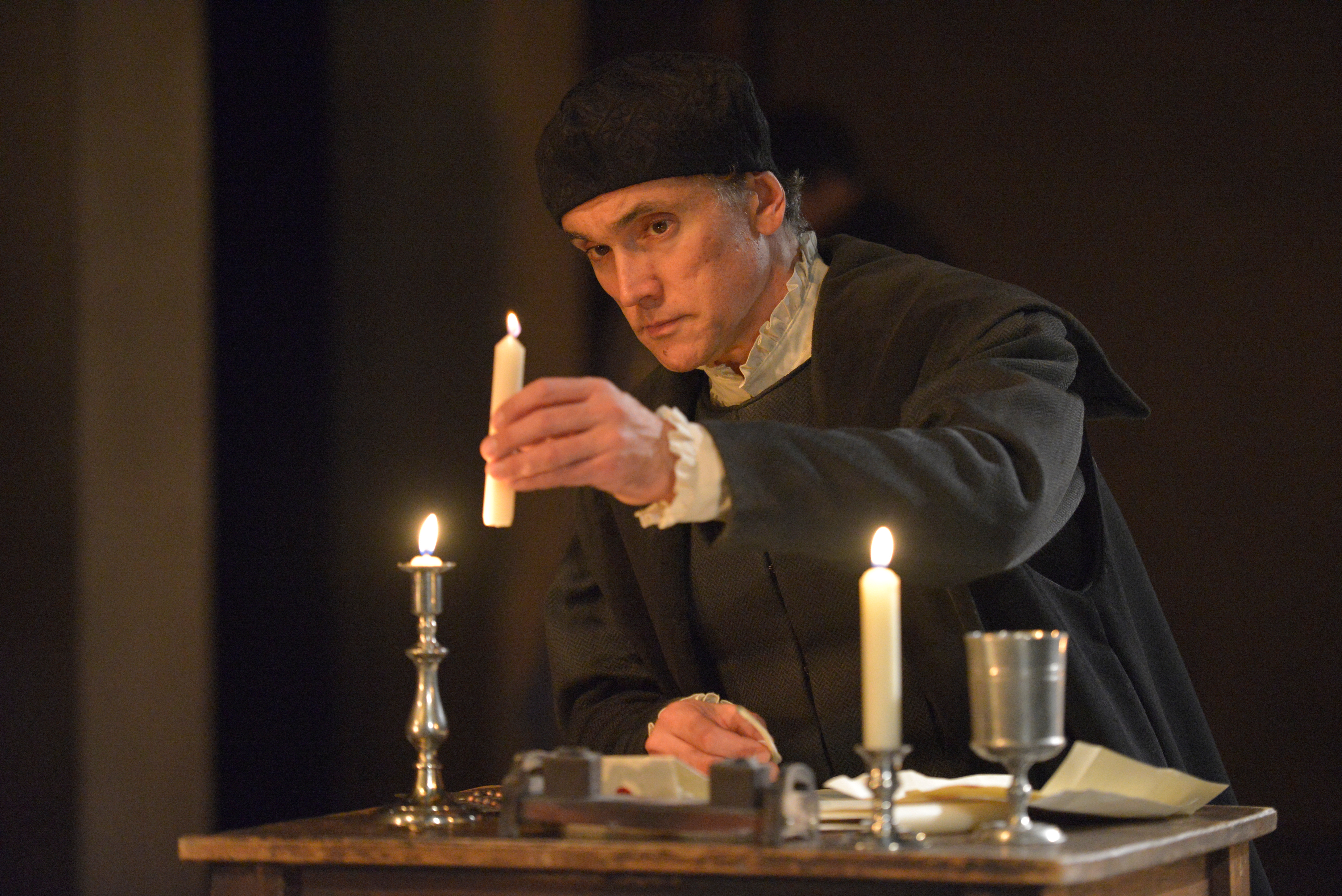Three things you might not expect of the RSC’s adaptation of Hilary Mantel’s Tudor novels. First, Mike Poulton’s plays have some great jokes. Laugh-your-head-off funny, you might say. Second, although Tom, Dick and Mary tell me they found Mantel’s Bring Up the Bodies a more enjoyable read, Wolf Hall is the better play. Finally, the reinvention of the brutal Thomas Cromwell as someone you would have liked is, in the plays, a source of weakness as much as strength.
Not that these are weak plays: six hours is a long time to spend on a theatre seat, yet I would happily see these plays back-to-back again tomorrow. They are beautifully staged, and many simple, wonderfully lit images linger in the memory: a funeral in the snow, a barge being rowed silently down the Thames in the rain. The costumes are Tudor, the language crisp and modern, many performances are outstanding: in particular Lucy Briers, who plays a wonderfully formidable Katherine of Aragon and a memorably venomous Jane Rochford, sister-in-law of Anne Boleyn.
The history is, well, dodgy. But these are works of fiction, drawn from works of fiction, and what matters is whether the inventions are successful. For the most part they are. The story, from Henry VIII falling in love with Anne Boleyn, to her death on the scaffold, holds you to the end and leaves you wanting more: a third play adapted from the yet-to-be completed final book of Mantel’s trilogy. But I hope Cromwell’s heroic status passes and that his victims are drawn more sympathetically than they are here.
The Cromwell of Wolf Hall is a lean, mean Putney boy come good. The son of a brutal drunk, he is a reformed thug, a loving family man who is also a devoted servant to his mentor Cardinal Wolsey. Ben Miles’s performance as Cromwell delivers both menace and warmth, in particular in the scenes with his openhearted son Gregory. But what we don’t see in the plays is the real Cromwell, whom an audience would find hard to like. His darker deeds are either ignored or played down, with Thomas More and Anne Boleyn the principal victims of the whitewash.
More despises the Cardinal, whom he calls ‘the most corrupt priest in Christendom’. But in Wolf Hall we see that More has none of Wolsey’s humanity. A self-flagellating masochist, a cruel fanatic who approves of burning heretics, he is intent on suppressing Tyndale’s English translation of the bible. Cromwell (who in reality would send many people to horrible deaths for their beliefs, and oversee the destruction of printed books and unique manuscripts) has an apparently more modern, secular frame of mind. We hear what Cromwell does not believe, not what he does, while More’s beliefs appear to amount only to prejudices. When More ends up in the Tower, we understand it is because he refuses to sign the Act of Supremacy, but not why there is any important principle at stake. It is as if More is choosing martyrdom as just another act of masochism, or weirdo fanaticism.
Nevertheless Thomas More seems a more rounded human being than the character of Anne Boleyn in the second play. With her long sleek hair, and high-bridged nose, Lydia Leonard’s Anne is Kate Middleton gone over to the dark side: a shrieking, vicious, termagant. Boleyn’s fate is sealed after she threatens to destroy Cromwell, angry that the honourable fellow wants to prevent her from harming Katherine of Aragon’s vulnerable daughter Mary (a younger, madder version of Kathy Burke’s Mary in the Shekhar Kapur film Elizabeth).
Certainly the historic Anne did threaten Cromwell. But it was in a nobler cause than is allowed here. She wanted to spend money raised from dissolving failing monasteries on education, while Cromwell wanted to pour it into the King’s pocket, and destroy all monasteries. Keeping Cromwell looking good helps keep the audience invested in him. But we feel little for Anne when the dénouement comes in Bring up the Bodies, and she ends up in the Tower. Nor do we feel much for those brought down with her, all almost equally repellent. This sucks emotion from the drama.
Many of Cromwell’s victims warn him he, too, will fall one day. I hope Poulton adapts the third book of Mantel’s trilogy, which will tell that story, and that he takes more risks with Cromwell. At the end of Poulton’s Wolf Hall, Cromwell talks about England entering a new era, turning towards God. The words are incongruous from the secular man we have met thus far. But England was entering a new era, one of bloody religious division, with Cromwell torturing, killing, risking his life and dying on a particular side of the divide. It is that Cromwell I hope to meet next: warts and all.









Comments